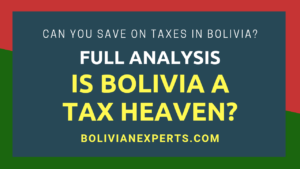Bolivia currently does have laws that allow stock markets to exist, as well as a company that runs the country’s stock market, but it also has too many limitations, inefficiencies, and a culture that doesn’t support the use of these financial instruments by both local investors and firms. Then, being in the Bolivian stock market is usually a last resort for Bolivian companies and people.
Bolivia does have a stock market, called BBV, but it’s very tiny and has almost no impact on the Bolivian economy. With only 51 firms publicly listed, a $15.5 billion equity market capitalization, and no stocks for sale for investors, this stock market is often not really useful to locals and foreigners.
Here we’ll be talking about the Bolivian stock exchange market, how it works, its main features, interest returns, regulations, and participants. You’ll see why this stock market is so tiny and how foreigners can participate in it, and if it makes sense to do so, among other aspects and details.
Yes, Bolivia has its own stock market
Bolivia actually does have a stock market, called the Bolsa Boliviana de Valores S.A. (Bolivian Stock Exchange) or BBV, but it’s very tiny compared to the Bolivian economy, as only it has a few tens of companies. This stock market is also extremely small if you compare it with international markets like NASDAQ or similar ones.
Even more, the government doesn’t run the stock market of Bolivia, instead, it’s managed by a private company. Despite this, anyone can invest in the Bolivian stock market and also some investment fund firms do this as their main activity.
You can find the official website of the BBV (Bolsa Boliviana de Valores S.A.) in the following direction:
- https://www2.bbv.com.bo/ (Translated by Google: Link)
It’s worth mentioning that the BBV is not really used what’s an investment way by the general population in Bolivia, as it usually offers annual return rates of around 4.5%. And it’s also rarely used by most firms as a financing method, as its application process is very difficult to complete, among other reasons.
Can foreigners participate in the Bolivian stock market (BBV)?
On paper, people from overseas can participate in the Bolivian stock market in 2 different ways:
- As normal investors. By acting like investors and buying bonds, debt promissory notes (not really stocks) in this market earn interest and other related incomes from the public company.
- As public companies. By becoming public companies in this stock market and getting financing and investors through it. Technically both Bolivian and foreign companies can enter this stock market, but it’s very difficult, and it’s rarely used, as we’ll show you later.
So, the 1st way that you as a foreigner can participate in the Bolivian stock market is by investing in buying stocks in this market. To achieve this you will always need a Bolivian valid visa. The right visa for this is the Multiple Visa (Visa Multiple), other types of Visas also allow you to invest in this market.
We have a detailed guide about all the Bolivian visas that will allow you to invest in the Bolivian stock market BBV, including the Multiple Visa, Working Visa, among other ones, in the following direction: The Bolivian business visa, everything to know. Link
In theory, the 2nd way to participate in the Bolivian stock market is as a public firm, but this process is almost non-existent in Bolivia for both Bolivian and foreign companies. The BBV as we just said before only has around 50 companies publicly listed from the nearly 300,000 operating within the country.
Bolivian stock market vs top worldwide stock markets
Now let’s see how the Bolivian Stock Market (BBV) compares to other international stock markets available around the world.
1) General performance
In 2021, the BBV stock market had only 51 listed S.A. firms (S.A. is analogous to a C corp.), all these companies combined had a total size of $14,591 million ($14.6 billion). As you can see this stock market is extremely tiny compared to international stock markets available.
You can see all the current public companies (S.A.) in the BBV in the following direction:
Also, throughout the history of the BBV stock market only two entities have ever issued stocks of variable earnings, so stocks are currently “absent” in the Bolivian stock market, and only bonds and similar instruments are available for investors. Of the ~300,000 companies in Bolivia, only ~10,000 are S.A. and only two of them have ever been financed by stocks.
We have also to warn you that the Bolivian stock market BBV it’s not as easy to invest in as well-known international stock markets, as this is indeed a difficult process always involving the use of a brokerage firm as an intermediary, for both locals and foreigners.
Then, the Bolivian stock market here is really tiny, lacking both stocks and investors, only offers bonds and its impact on the Bolivian economy is almost negligible.
Additionally, the BBV lacks accessibility and real-time information tools, making it very difficult for the average person to even try to invest in this stock market.
As we said, what is only available in the Bolivian market are bonds and debt promissory notes, mainly issued by the largest banks of Bolivia, also by very big public companies and the government itself, offering a fixed return over time. So, as you would expect, the returns are very low as these are very safe financing instruments.
2) Return rates
The return interest rates in the Bolivian stock market BBV are generally between 3% and 6%, but in very few cases they can reach up to 7.5%. These rates are quite low if you compare them with the average return rates of around 9% of common index funds in the United States.
3) Overall Risk
On the other hand, the overall risk of the Bolivian stock market is a lot lower than in other markets, but as you may know, that relationship between risk and rentability also applies here, then for the only bonds and debt promissory notes available in this market, which are very safe in general, you will get only around 4.5% in annual returns.
4) Size comparison
The BBV Bolivian stock market has a total equity market capitalization of about $14.5 billion, which is nothing if you compare this number with the size of international stock markets like the New York Stock Exchange or NASDAQ, with total assets of $22.11 and $17.23 trillion respectively.
So, the Bolivian stock exchange market BBV is around 1,3/1000 the size of these 2 other international stock exchange markets, or about 0,13% of their size.
5) Brokerage firms
Currently, the Bolivian stock market has 2 main brokerage firms that together handle nearly 80% of all the transactions made in this market. These 2 companies are:
- Bisa S.A. Agencia de Bolsa (Bisa Stock Brokerage).
- Santa Cruz Securities Agencia de Bolsa S.A. (Santa Cruz Securities Stock Brokerage).
The rest 20% of the transactions and investments are handled by other types of brokerages, like the SAFIs (investment fund companies) and Bolivian pension administrators (AFPs).

Cpt: Top: The Bolivian stock market BBV. Right: The ASFI regulator. Left and bottom: The 2 main brokerage firms.
6) Regulations
The Bolivian stock market is currently regulated by the ASFI government entity. This entity is in charge of regulating all the banking and financial systems of Bolivia, but also the stock markets that may be available at a given time.
As the legal framework for the creation and existence of stock exchange markets in Bolivia, the current law in the country is the Law No. 1834 “Ley del Mercado de Valores” or Market Exchange Law, can download it at the following link:
- Ley No. 1834 Mercado de Valores (also translated by Google: Link).
This it’s a very outdated Law (from 1998) and for this reason, is currently restricting and negatively impacting the development of the stock exchange market in the country.
Other details about the Bolivian stock market
The following are other important facts and details about the Bolivian Stock Market:
- The Bolivian Stock Exchange Market is owned and managed by a private company called Bolsa Boliviana de Valores S.A. or BBA S.A. (Bolivian Stock Exchange).
- It was founded back in 1978 but it only started operations in 1989.
- Currently, this market only has a few companies that are publicly listed, more precisely 51 firms.
- In this market, stocks of variable return have been traded only 2 times throughout its existence.
- What is only traded in the BBV are stocks of fixed returns, like bonds, debt promissory notes, and similar financing instruments.
- Its total equity market capitalization is about $14.6 billion.
- Currently, the firms that participate in this market are mostly banks, government companies, and other very established and old firms.
- In Bolivia, there is a lack of culture in investing in stocks or financing entrepreneurship with them.
- The regulations are quite outdated and don’t well support stock exchange markets in Bolivia.
Conclusions:
In this guide about the Bolivian exchange stock market, you’ve seen that it actually exists and it’s owned and run by a private company, called Bolsa Boliviana de Valores S.A. or BBV. But you also realized that it is very tiny compared to the Bolivian economy and it almost has no impact on the country, its people, or Bolivian companies.
You have known that this stock market has exchanged actual stocks of variable earnings only 2 times throughout its history, and what is almost only transacted in this market are bonds, debt notes, promissory notes, or similar instruments of fixed returns. Also, this stock market currently only has 51 publicly listed companies, most of them being banks and government firms.
You also have known some numbers about the Bolivian stock market, with its equity market capitalization being around $15.5 billion, interest rate returns going from 3% to 7%, almost all of them coming from bonds, promissory notes, and similar instruments, and that, compared to international stock markets, BBV is very tiny with about 0,13% of their size.
Finally, you’ve realized that it’s actually possible to invest or be listed as a public company in the Bolivian stock market, but most of the time it’s very difficult and in many cases, it’s not worth the time and effort for both locals and foreigners, although this may be different for your current situation.
We hope this information has helped you, and if you want to know the best advice and tips to invest in Bolivia, including the best fields and industries available, risks, and strategies from our perspective as Bolivians, visit our dedicated guide in the following direction: Investing in Bolivia, best strategies and all the facts to know.
BolivianExperts.com, information about how to live, work, invest, and travel in Bolivia.








